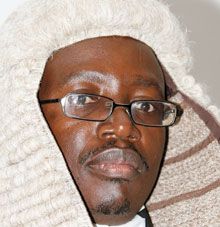Mhlauli's release on bail triggers ethical quandary
TSHIRELETSO MOTLOGELWA
Staff Writer
| Thursday February 14, 2008 00:00


Commentators in the legal fraternity and the general public are perplexed by the ethical dilemma regarding Dingake's ability to objectively handle the case.
Mhlauli who was serving a seven-year prison sentence following his conviction on two counts of abuse of office and giving a commissioner of oaths false information, was granted freedom by Dingake after his successful bail application, pending appeal.
Monthe says the fact that he was representing a client before a court led by his cousin does not cast aspersions on the ability of the court to deliver justice 'without fear and favour'.
'It is not a secret that Key Dingake is my first cousin. He is my aunt's son. However, I do not see why that would influence the judge's consideration of the issues in the case,' explains Monthe.
He says a legal system such as Botswana's has mechanisms in place to ensure that situations such as these do not have an adverse effect on the outcome of cases. Monthe says he is related to a number of judges and he has often lost cases before them.
'In a court of law, it's the law that is applied. People make arguments based on the law. And whatever judgement comes out is a result of rigorous debate based on legal arguments and established laws. We have laws and guidance from past cases, which the judge uses to draw his own conclusions,' argues Monthe.
He adds that Dingake's judgement, like that of all other judges, is open to scrutiny by the general public and all the legal minds in the country.
However, Duma Boko, of the Botswana Law Society argues that justice is also a matter of perception. 'Justice must not only be done, it must be seen to be done,' he says, although he did not want to be drawn into a discussion about the impact of this issue on the justice system.
Attempts to get a comment from Dingake were unsuccessful. 'I am currently on a very tight schedule and I won't be able to comment,' he said. Boko says there is nothing in the legal system of Botswana which compels the recusal of a judge in a situation where issues of conflict may arise concerning his or her handling of a case.
'It would be up to the judge to consider the situation and maybe recuse him or herself. Or anyone in the case might argue for that,' he says.
In many legal systems around the world, judges, lawyers and anyone directly involved in the proceedings within a court are supposed to be devoid of any factors that may put to question their ability to attend to cases objectively and impartially. Often the judge is required by a code of ethics to recuse him or herself if he or she has personal relations to anyone directly involved in the case.
Dingake granted Mhlauli bail with conditions, among them, that he reports to the Gaborone Central Police Station every week, that he surrenders his passport and travelling documents to the Registrar of the High Court and submits a surety of P1,500.
In considering the merits of the application, Dingake accepted that the appeal had prospects of success; one of the major considerations which led to his decision to allow bail.
He dismissed the state counsel, Boyce Rampete's argument that Dingake was not well placed to deliberate on the matter given that the court records from the previous case had not been availed to him.
The judge said that he had satisfied himself that the material before him was sufficient to handle the application.
